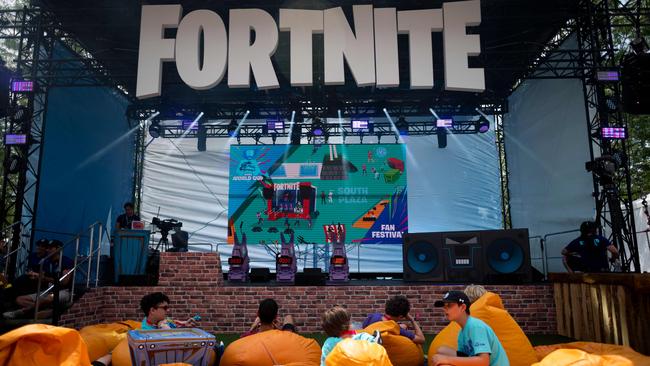It’s game on: Fortnite takes on Apple and Google
The company behind the hit video game Fortnite is spearheading a battle app developers have waged for years against two of the world’s tech giants.

Tim Sweeney, chief executive of the company behind the popular video game Fortnite, is now spearheading a battle that app developers have waged for years against two of the world’s biggest technology companies.
And he is uniquely positioned to lead that fight against Apple and Alphabet’s Google. Mr Sweeney and his company Epic Games have deep pockets. He is worth more than $US8.5bn, according to Bloomberg’s Billionaires Index, and his company is valued at $US17.3bn, landing investments from companies including Walt Disney, Tencent and Sony.
Unlike others who have challenged Apple and Google, Epic is closely held, meaning it faces less pressure from shareholders. And Fortnite boasts a massive and loyal user base — with more than 350 million registered users worldwide — that has been nudged to show their dismay about the situation on social media.
“Tim is altruistic and wants this to be a fight for the little guy,” said Mike Salmon, an executive at Magid Consulting, a video game advisory firm in Los Angeles. He thinks Mr Sweeney and Epic are going down this path now because of the stiff antitrust scrutiny Apple and Google are facing and because Epic is looking to build out its own digital game store beyond the strictly computer games it sells now. “Epic is making a retail play,” he said.
Apple and Google pulled Fortnite from their app stores on Thursday after Mr Sweeney’s Epic rolled out a new way of making in-game purchases that circumvents the 30 per cent cut the tech giants take from digital transactions within apps.

Epic was spoiling for the fight, as it filed separate federal lawsuits, more than 60 pages each, against Apple and Google within hours of the app’s removal. The game developer hired Cravath Swaine & Moore, the same law firm chip maker Qualcomm employed to defend itself against antitrust allegations brought by the Federal Trade Commission, to bring the lawsuits.
Apple and Google separately declined to comment on the litigation, but both have successfully defended their business models from a host of challengers over the years. They are cash-rich and operate app marketplaces that appear on nearly every smartphone in the US, giving them power over which mobile software people can and can’t obtain and unique access to myriad consumer data.
“The App Store guidelines ensure a high-quality, reliable and secure user experience,” Apple CEO Tim Cook said last month at a congressional hearing. “The only apps that are subject to a commission are those where the developer acquires a customer on an Apple device and where the features or services would be experienced and consumed on an Apple device.”
A number of app developers, including videostreaming company Netflix, dating app provider Match Group and music-streaming service Spotify, have challenged or publicly complained about the 30 per cent commission.
Social media giant Facebook on Friday joined those protesting the fee, when during a launch of a new virtual-events business the company said it asked for but didn’t get an exemption from Apple. Facebook said the 30 per cent cut makes it harder for small businesses that are having to shift certain operations online. “For small businesses struggling through a pandemic, every dollar matters,” said Fidji Simo, head of the Facebook app.
Mr Sweeney, who learned to program on an Apple II Plus home computer, is something of an iconoclast, running his company thousands of miles from Silicon Valley — in North Carolina — and having antipathy toward tech giants dictating the fate of the industry’s smaller players. Running Epic, which he founded in 1991 from his parents’ basement with $US4000 in personal savings, is the only real job the 49-year-old says he has ever had.
And this isn’t the first time Mr Sweeney has stared down tech giants. He successfully pushed for longtime rivals Sony, Microsoft and Nintendo in 2018 to make the unprecedented move of enabling players on their respective consoles to play with one another, calling the months-long negotiations “an effort in international diplomacy.”
Epic’s lawsuits could have serious consequences for Apple and Google, said lawyer Damien Geradin. For one, Apple could be forced to change a lucrative business model important to its overall success, he said. And both Apple and Google might need to disclose confidential emails and other information as part of the discovery process, he added.
For Epic, the decision by Apple and Google to boot Fortnite isn’t a major short-term setback. It opened its own digital computer-game store in late 2018, and it collects 12 per cent of sales from external developers. Mr Sweeney has said the revenue-sharing arrangement leaves his company with a decent profit margin.
“At the most basic level, we’re fighting for the freedom of people who bought smartphones to install apps from sources of their choosing, the freedom for creators of apps to distribute them as they choose, and the freedom of both groups to do business directly,” Mr Sweeney said in a tweet on Friday.




To join the conversation, please log in. Don't have an account? Register
Join the conversation, you are commenting as Logout